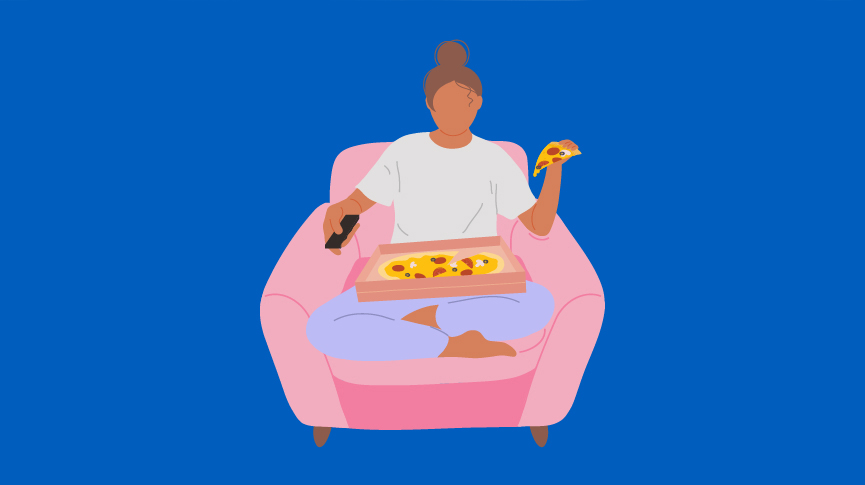Why We Feel Hungrier On Our Periods

If you find yourself full of cravings around the time you get your period, you’re not alone. It’s extremely common for women to start reaching for extra snacks when menstruation is around the corner.
But why is it that we get hungrier around our periods? The popular misconception is that you burn more calories on your period (perhaps because some people think that losing blood means losing calories).
Turns out, while your resting metabolic rate does rise slightly during your menstrual cycle, your “period munchies” are more due to hormonal fluctuations than any significant spike in metabolism.
In this article we discuss the hormones that make you hungrier around your period, what is happening when you start craving chips and sugar, and some ways to cope with your change in appetite.
Does your period make you burn more calories?
Your resting metabolic rate, or RMR, only rises a tiny bit on your period, so you’re not actually burning a significant amount more calories than normal just from having your menstrual cycle.
Although further research is needed to find out exactly how much metabolism fluctuates during this process, a small 1996 study found that people who do have a slightly higher RMR during their luteal phase (when estrogen surges and the uterine lining thickens) only burned 100-300 calories more than normal. That’s the caloric equivalent of a small sandwich or large avocado, and certainly not the family-sized bag of crisps or box of chocolates you may be tempted to finish.
Hormonal Changes That Make You Hungrier
Your hormones fluctuate significantly through your menstrual cycle, and the same hormones that may make you sleepier or more prone to mood swings also impact your appetite. Hormones like estrogen and progesterone regulate the menstrual cycle, and shifts in these hormone levels affect your hunger levels.
Progesterone dominates
In the days leading up to and during your period, progesterone levels drop but become the dominant hormone in your body. As progesterone stimulates appetite, your hunger levels may increase.
Estrogen levels rise and fall
Estrogen levels rise and fall- twice- throughout your menstrual cycle. The mid-cycle drop in estrogen can increase hunger cravings (and moodiness) since the hormone suppresses your appetite and regulates your mood.
Higher cortisol levels
Often referred to as the “stress hormone,” cortisol also plays a role in your appetite, particularly in the follicular phase, which starts the first day of your period and ends after the ovaries release the egg. A 2020 meta-analysis reported that cortisol levels rise during the follicular phase after the luteal phase, which explains why cravings are a common complaint with PMS.
Why Do I Crave Carbs and Sugar On My Period?
Cortisol is largely to blame for wanting more high-fat, sugary foods during the menstrual cycle. Higher levels of cortisol are directly correlated with overeating, and the high cortisol levels that occur during a menstrual cycle often causes people to want “comfort foods” that give them an immediate rush of satisfaction. Plus, there’s the added physical discomfort like cramps.
Sugar and starch makes us feel good because they cause the body to release serotonin, which is why you may be reaching for a bowl of pasta or some cake when you’re in bed with cramps. Let’s be real- most of us aren’t craving more salad or chicken breast when irritable or tired.
How To Handle Your Appetite
While being a bit hungrier on your period is normal, an excessive amount of hunger brought on by your cycle could be a sign of more serious underlying health conditions. If you feel like you’re never full around your period, you should consult with your doctor to make sure there isn’t anything else (like a hormonal disorder) causing you to eat everything in sight.
For those who are wondering how to deal with their cravings, here are some tips on how to stay physically and mentally healthy when all you want is to curl up with some ice cream.
Don’t feel guilty
Firstly, don’t feel bad about having the munchies! Society indoctrinates women from a young age by labeling foods “good” and “bad.” If you feel like having some mac and cheese or whatever your comfort food is, then allow yourself to fully enjoy it; periods can be extremely painful and uncomfortable, so listen to your body, rest, and don’t add additional guilt to the discomfort.
Choose healthy snacks that keep your blood sugar stable
That being said, loading up on sugar can worsen your mood swings and make you more irritable when your blood sugar levels crash shortly after eating, making it more difficult to go about your daily activities. To keep your blood sugar levels (and mood) stable, try and choose healthier snacks with protein and fiber that fuel your body with the necessary nutrients like fruit and veggies, whole-grain toast with almond butter, or an extra portion of a healthy meal.

Clara Wang is a freelance writer based in Nashville, TN but often found abroad. She mostly muses about the three best things in life: Food, sex, and music. Her work has been featured in publications such as Eater Austin, Eater Nashville, Giddy, Buzzfeed, Refinery29, the Austin Chronicle, the Austin American Statesman, and the Daily Dot.


